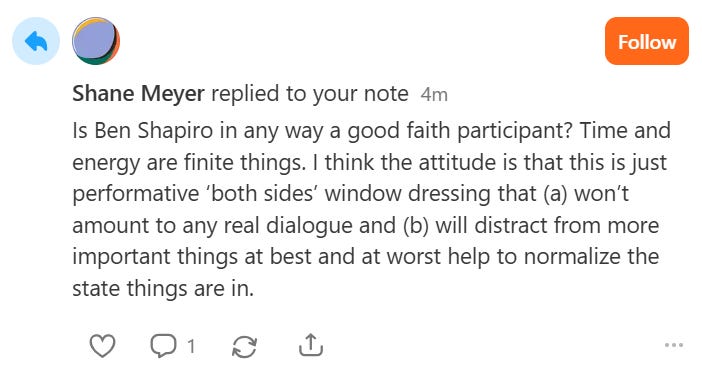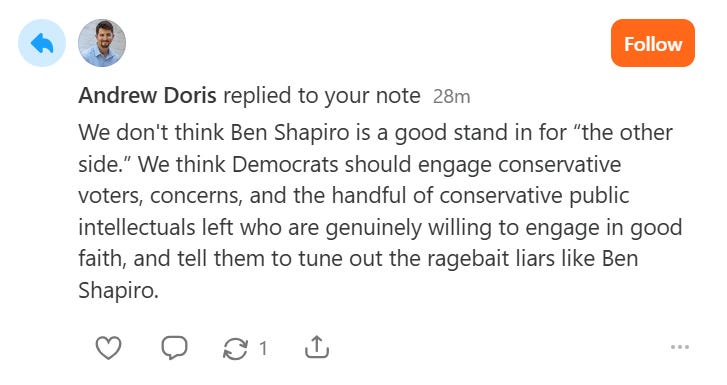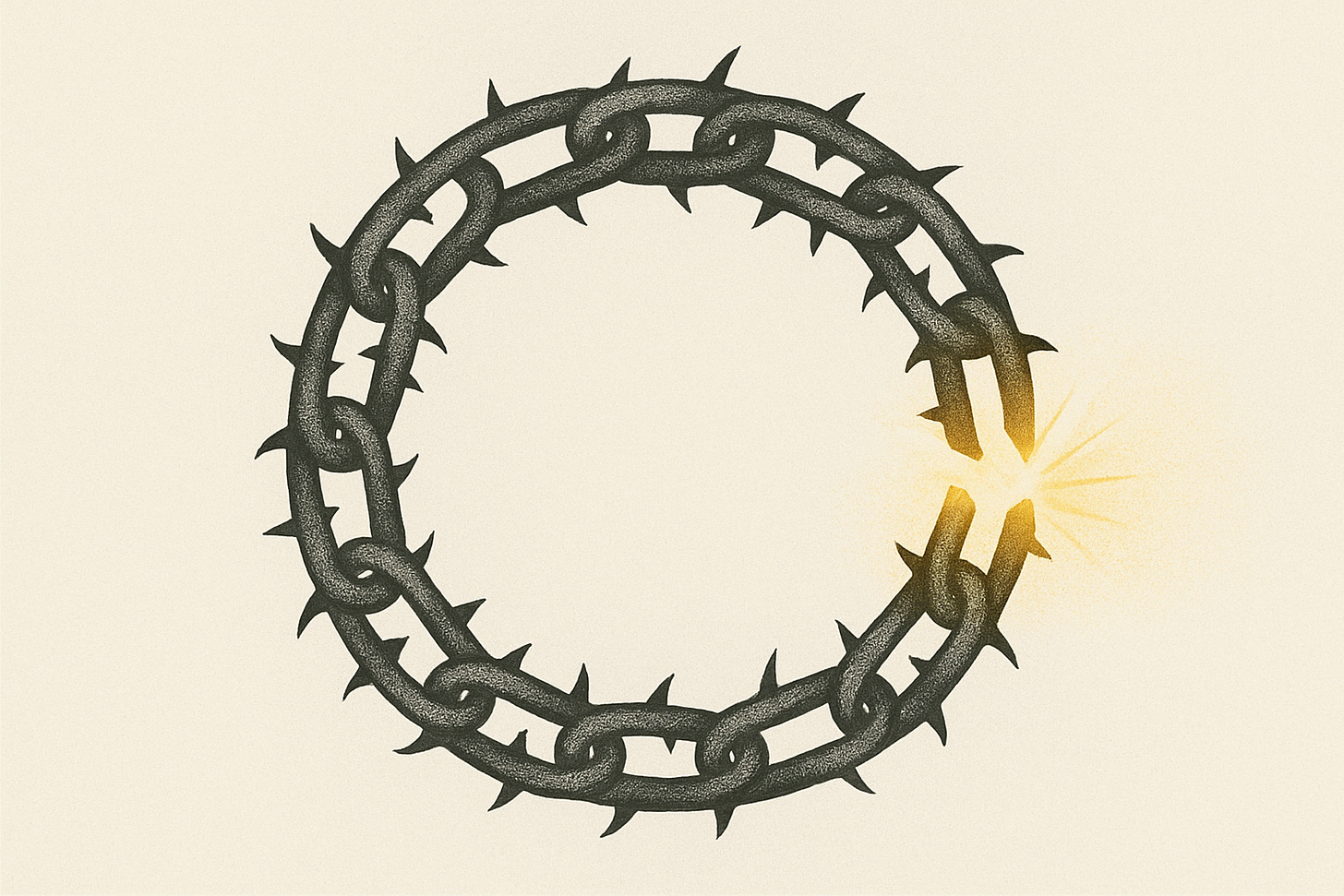Enough is enough
A special 1,000-subscriber post about good deeds and bad faith.
I started BIG iff TRUE last April for a very simple reason: I thought the name was funny.
But what started as a vehicle for JP jokes and game theory explainers has become, to my surprise, a more serious project. Thanks to a shout-out from
, as well as the Wave, I’ve hit 1,000 subscribers. And I want to commemorate that milestone with a short post from the heart about political violence and the suffocating presence of bad faith—and accusations thereof.Last week, Charlie Kirk was shot to death in front of a crowd of students at Utah Valley University. This was a horrifying crime in broad daylight, as well as an attack on the fundamental values of university life. (In a sign of the times, my hairdresser heard about the killing from her six-year-old nephew, who within hours had seen the uncut footage on his iPad multiple times.)
A few days later,
released a conversation with Ben Shapiro (recorded before Kirk’s assassination), which he prefaced with some impassioned remarks on political violence and the perils of it spiraling.In my life, I don’t think we have ever felt as close as we do now to some kind of violent national rupture. Because it’s not just Kirk. In the last few years, a bullet nearly ended Donald Trump’s life. A man tried to burn Josh Shapiro and his family alive in their home. A man broke into Nancy Pelosi’s home to kidnap her. And when he didn’t find her, he fractured her 82-year-old husband’s skull with a hammer. The former speaker of the Minnesota House and her husband were assassinated. The CEO of United Healthcare was gunned down in Midtown Manhattan, and many lionized his killer.
Violence is viral. It infects. It spreads. Violence is combustible. It blazes into civil wars, into world wars, into totalitarian turns. Who knows which spark will light the wildfire?
I thought this was a moving statement, coming at a time when our country is in danger of meeting an unjustifiable crime with an unjustifiable crackdown on rights. But many commentators took this as an opportunity to dunk on Klein for talking to the wrong people. (Much as Bernie Sanders was excoriated in January 2020 for talking to Joe Rogan.) Eventually I got fed up and responded.
The response was mostly—and unexpectedly—positive. But among the negative comments, I noticed an intriguing trend, part of a pattern emerging in our political discourse. Some commenters said that talking to Shapiro was pointless and wrong because he’s acting in bad faith.
Another response, all too familiar, was that [my group] shouldn’t have to change its behavior until [your group] does, first.
I couldn’t disagree more. We are so inured to these two trends—the shunning of “bad faith” interlocutors, and the “you first” approach to moral improvement—that they have become acceptable ways of shutting down conversations and making excuses for silence. This is toxic sludge being pumped into the civic infrastructure of our democracy. It’s poisoning the way we think about one another, and it’s clogging the only channels we have left for meaningful conversation and persuasion.
Let’s take bad faith first. If someone’s arguing in bad faith, they’re being deceptive or insincere. They’re citing principles they don’t believe in, making cynical arguments to score points, and so forth.
There are, obviously, some bad faith actors out there. And there’s nothing wrong with being reluctant to engage. But the “bad faith” accusation has morphed into something far worse than “don’t feed the trolls.” Rather than a prudent move, it’s become an abdication of basic democratic values.
The problem is that there are two operative principles of bad faith.
It’s wrong to engage with anyone acting in bad faith.
Virtually everyone on the other side is acting in bad faith.
Neither of these is a diaster on its own. But if you put them together, you are effectively giving up on democracy. You’re saying that we shouldn’t be resolving conflicts by talking and listening—which of course raises the question of what we should be doing instead.
What do you think the answer is? Take a moment to guess what the “bad faith” crowd would say. Then read this.
This is—literally—asking for a cold civil war. Do I really need to remind people how catastrophically bad a civil war can get? (Don’t make me quote Leviathan. I’ll do it.)
Now, many commenters replied that they don’t see everyone on the other side as operating in bad faith. Just Ben Shapiro—he’s unusually dogmatic, and he’s unusually extreme. But this just isn’t plausible. Shapiro refused to vote for Trump in 2016. His audience is unbelievably massive—he is a contender for the most-watched figure in all of conservative media, with 9.6 million followers on Facebook alone. (By comparison, Bernie Sanders has 7.5 million.)
If Ben Shapiro is off limits for conversation, so is nearly half the country.
Another objection is that Shapiro won’t change his mind, so it’s pointless to talk to him. Now, I’m not sure about the premise of this—it bears repeating that he refused to vote for his party’s candidate in a prior election, which by itself makes him more open-minded than much of the country.
But even if you can’t change Shapiro’s mind, there are still extremely important reasons why you might want to talk to him. Conversation across political difference has invaluable side benefits: mutual understanding, reduced hostility, and a better sense of the weak spots in one’s worldview. Most important, however, is that a systematic shutdown of these conversations will lead to echo chambers. Not only will you never hear what the other side thinks: they will never hear what you think. There is just no way to get your ideas out into the world if you treat the public as inhospitable towards your ideas, due to their irredeemable “bad faith.”
The final objection I’d like to consider is that the good guys shouldn’t have to fix a problem that bad guys started. This objection comes in many forms:
“The right shouldn’t have to worry about free speech. The left has been trashing it for years!”
“The left shouldn’t have to denounce political violence. Centrists have allowed the economic conditions that led to it!”
“Centrists shouldn’t have to engage with the MAGA right. They’re the ones that…”
Blah, blah, blah, blah.
As with the “bad faith” principles, my concern isn’t with any of these ideas in isolation. My concern is that they coalesce into a system that conveniently excuses inaction no matter the stakes. Everybody’s pointing fingers; nobody’s getting their hands dirty. Everybody’s feeling superior; nobody’s doing the hard work of a democracy, which is to find the shreds of humanity in everyone and somehow weave them into a social fabric that can support a decent, peaceful, free way of life.
We need a politics of CPR, if I may borrow David Foster Wallace’s line on fiction.
Look man, we’d probably most of us agree that these are dark times, and stupid ones, but do we need fiction that does nothing but dramatize how dark and stupid everything is? In dark times, the definition of good art would seem to be art that locates and applies CPR to those elements of what’s human and magical that still live and glow despite the times’ darkness. Really good fiction could have as dark a worldview as it wished, but it’d find a way both to depict this world and to illuminate the possibilities for being alive and human in it.
I’m done making excuses. I’m done with nihilistic dunking. I’m done waiting for the democracy fairy to come out of the sky and apply CPR to our flatlining national conscience.
At some point, we have to stop waiting for other people to be the first to make a change. Otherwise we’ll be waiting forever.








It seems to me like at least some of the time people are claiming their opponents are acting in bad faith, they are actually failing to have a theory of mind for people who think differently. "He can't possibly think that, he must be lying for cynical reasons!" No, some people just don't view the world as you do, and they're being very sincere. This is worst when then topic is something like my side/your side violence arithmetic.
Thanks for writing this! I totally agree that if we can't break through the gridlock and actually engage in dialogue, we have precious few other options. (I just hit 1000 this week too! A very exciting milestone- congrats!)